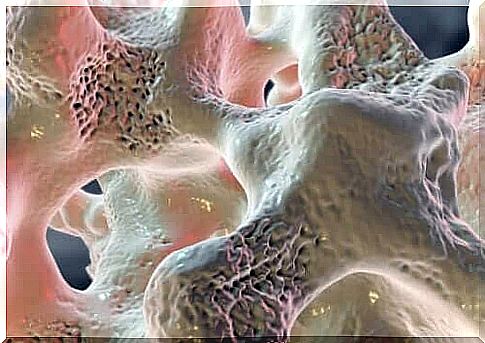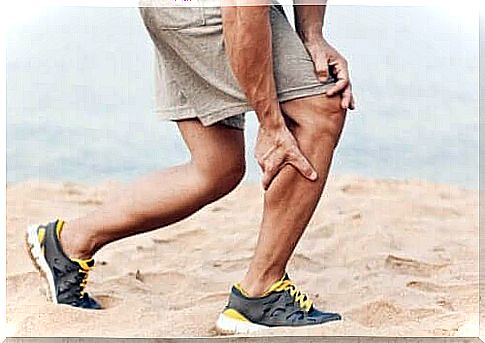Consequences Of Calcium Deficiency

Calcium deficiency is a nutrient deficiency that adversely affects health. Calcium is one of the most abundant minerals in the human body, and it is important to ensure its adequate intake through food on a regular and continuous basis so that we do not suffer the harmful consequences of this mineral deficiency. What are the consequences of calcium deficiency? Keep reading.
Fortunately, many of the products we eat contain calcium. Adherence to a varied diet ensures adequate intake, but vitamin D is also important to ensure calcium absorption.
Although calcium is abundant in nature, some people suffer from a deficiency. In this article, we explain why it is important to monitor calcium intake, especially during menopause.
Consequences of calcium deficiency: osteoporosis
Osteoporosis is a common disease in menopausal women. It causes gradual bone demineralization, which increases the risk of fractures. This affects the lifestyle of the sufferer.
Once a disease has begun to progress, it is difficult to reverse anymore, which is why its prevention is so important. Available medications and treatments can try to stop the damage that has already occurred, but bone repair is almost impossible. Calcium deficiency in adulthood is a potential risk factor for osteoporosis. This is confirmed by a study published in Maturitas , in which adequate intake of this mineral has been combined with reduction of the effects of osteoporosis.
In any case, it is important to keep an eye on the consumption of that nutrient so that its amount is not exceeded either. Its excessive intake leads to kidney stones, so the daily dose should not exceed 2,000 milligrams.
In addition to calcium intake, repeated exposure to sunlight or controlled use of vitamin D supplementation is recommended. This micronutrient is involved in the absorption of minerals and bone metabolism. The combined use of these two nutrients helps reduce the risk of bone fractures in adulthood, as confirmed by a study published in Osteporosis International .

Calcium deficiency in athletes
Calcium is not only an important nutrient for passive people, but it is also especially important for an athlete’s body.
In athletes, in addition to ensuring electrolyte balance, maintaining adequate calcium levels in the body can help reduce the risk of muscle cramps. It has even been speculated that securing this mineral could help reduce leg cramps in pregnant women as well.
However, a study published in the Journal of Research in Medicinal Sciences has not found any clear link between them. A possible link has been speculated because calcium is involved in the metabolism of both neurons and muscle cells.
Calcium is involved in the conduction of nerve impulses. Excessive loss of this mineral in athletes through sweating can adversely affect muscle contraction and athletic performance. For this reason, it is important to ensure electrolyte balance by drinking mineral beverages during sports, especially at high temperatures.
Consequences of calcium deficiency: muscle twitching
One of the symptoms of calcium deficiency is fasciculation. These are muscle contractions that can be seen under the skin.
They are spontaneous and involuntary. They are not harmful and should not be worried about.
Under certain conditions, even a recurrent live mouse does not require a doctor visit. Instead, for example, pregnant women or people with high blood pressure may have a huge circulatory problem behind this symptom. This is not an emergency, but your doctor may order blood tests to diagnose the problem.

Ensure adequate calcium intake
To avoid calcium deficiency, it is important to regulate the amount of calcium in your diet. An effective way is to often eat nuts, green leafy vegetables and dairy products.
It is also important to remember that you are getting enough vitamin D to improve your calcium absorption. Vitamin D production can be boosted by repeated but safe sunbathing, and can also be obtained by eating fatty fish, eggs, and vitamin D-dairy products.
When vitamin D deficiency is suspected, a physician’s assessment of the potential need for supplementation is required. Vitamin D deficiency may increase the risk of disease in the medium to long term.
Long – term consequences of calcium deficiency
One of the most significant complications of calcium deficiency is osteoporosis. Although women are at higher risk of developing it, it can also be found in men. To reduce the risk, it is important to eat calcium-rich foods and also keep an eye on vitamin D levels. A good way to prevent this disease is to eat vegetables and dairy products.









